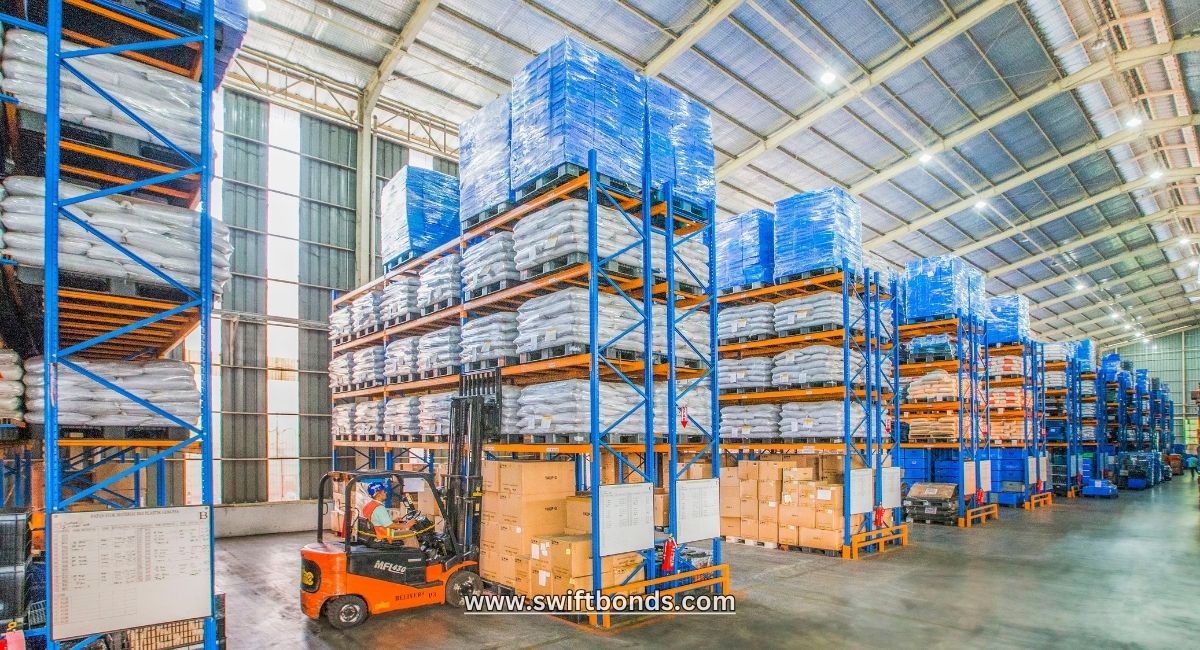Get an Instant Quote on Commodity Dealer and Commodity Warehouse Bond
Introduction
From our perspective, business owners managing both commodity storage and purchasing in Kalispell, Montana, want to simplify compliance while earning trust from producers and regulators alike. The Montana – Commodity Dealer and Commodity Warehouse Bond is designed for those who buy agricultural goods and store them for others under one operation. This bond allows eligible businesses to meet state requirements for both dealer and warehouse licensing using a single bond form—reducing costs and avoiding redundant filings.
The bond is issued through the Montana Department of Agriculture and guarantees that the licensee will fulfill all legal obligations related to both purchasing and warehousing commodities. That includes honoring payment terms, safeguarding stored goods, and providing accurate records. If a licensed operator fails to meet those responsibilities, the bond compensates injured producers or depositors.
This dual-purpose bond replaces the need to file both a Montana – Commodity Warehouse Bond and a separate dealer bond. It’s ideal for grain businesses, co-ops, and larger operations that handle both ends of the supply chain. For comparison, contractors working with infrastructure projects may require a Flathead County, MT – Road Work Permit Bond, but agricultural operators working across procurement and storage require this hybrid coverage to stay compliant and operational.

Montana Ag Operators Often Misunderstand Combined Bond Requirements
We’ve noticed that operators running dual-purpose facilities often assume that one bond automatically satisfies both licensing categories. That’s not always the case. A Montana – Commodity Warehouse Bond strictly applies to storage functions. It protects the physical inventory. The dealer bond, on the other hand, guarantees payment to sellers. Without both obligations covered, an operation may fall short of full compliance.
The combined bond is only valid if it meets the state’s volume and value requirements for both activities. Some assume they can reduce their bond value by averaging purchase and storage figures, but that puts them at risk. Each function—purchasing and storing—must be bonded according to its specific exposure level. That’s why Montana offers the combined bond—to simplify the licensing process without weakening regulatory coverage.
Another source of confusion is when businesses operate across county lines or add services, like road construction, to their portfolio. In such cases, they might need to file separate forms like the Flathead County, MT – Road Work Permit Bond while still maintaining their agricultural bonding under the Department of Agriculture. Understanding which agency governs which function is essential.
Swiftbonds Simplifies Dual Bonding For Montana Operators
Based on our experience, companies managing both commodity buying and storage need more than a bond—they need a clear process and dependable guidance. Swiftbonds helps Montana operators secure their Montana – Commodity Dealer and Commodity Warehouse Bond quickly and accurately, while also clarifying when additional bonds—such as the Flathead County, MT – Road Work Permit Bond—may apply to infrastructure-related projects.
Swiftbonds delivers:
-
Fast issuance of state-approved combined bonds for dual license holders
-
Flexible coverage amounts based on actual operational size
-
Assistance with determining whether to maintain separate or unified bonds
-
Guidance on renewals, audits, and volume changes that may impact bond value
-
Expertise in cross-sector bonding, including construction, agriculture, and logistics
Many operators begin with a Montana – Commodity Warehouse Bond and only later realize they require dealer bonding too. By switching to the combined bond through Swiftbonds, they reduce administrative load and improve regulatory alignment.

3 Steps To Secure A Combined Dealer And Warehouse Bond
What we’ve discovered is that a structured approach helps operators eliminate confusion, avoid license delays, and secure peace of mind. Here’s a simple way to get your Montana – Commodity Dealer and Commodity Warehouse Bond in place:
- Calculate Your Total Bond Exposure – Review your expected purchase volume and peak storage capacity. The Montana Department of Agriculture will use both figures to determine your bond value. Don’t underestimate—your bond must fully reflect both obligations.
- Confirm Eligibility For A Combined Bond – Not all operators qualify for a combined bond. It’s typically approved for entities that clearly meet both sets of licensing requirements. Swiftbonds can help verify your status with the state before application.
- Apply Through Swiftbonds For Speed And Accuracy – Submit your application online. Swiftbonds delivers the state-approved bond form and helps you file it with the Department. If your operation also requires other bonds, such as a Flathead County, MT – Road Work Permit Bond, we’ll assist with that too.
Each step ensures your facility operates within Montana law and gives your suppliers and clients the confidence they need to continue doing business with you.
Gaps In Bond Coverage Can Disrupt Agricultural Operations
In our observation, the most serious risk for dual-license holders is accidentally letting one side of the operation fall out of compliance. Many businesses renew their warehouse bond annually but forget to update their dealer bond—or vice versa. This can trigger penalties, license revocation, and loss of trust with producers.
Bonding issues often surface during audits or claims. If a dealer fails to pay a farmer on time or loses stored grain in a warehouse incident, and the bond doesn’t fully cover both, legal and financial consequences can follow. The Montana Department of Agriculture holds bonded operators accountable, and incomplete bonding offers no protection.
Even operators who hold a valid Montana – Commodity Warehouse Bond may find themselves noncompliant if they expand into purchases without increasing their bond coverage. Those working on parallel infrastructure projects may also require supplemental bonds like the Flathead County, MT – Road Work Permit Bond, further complicating the compliance picture.

Montana Operators Build Trust With The Right Bonding Strategy
We’ve learned that commodity operators who handle both buying and storage under a single, accurate bond are better positioned to succeed. Producers trust them more. State regulators process their licenses faster. And financial partners view them as lower risk. The Montana – Commodity Dealer and Commodity Warehouse Bond is more than a regulatory tool—it’s a business asset.
By consolidating both functions into one bond, operators simplify compliance without compromising protection. And when Swiftbonds is the provider, they receive full-service support across all sectors—from grain storage to municipal road permits like the Flathead County, MT – Road Work Permit Bond.
With strong bonding, businesses gain the flexibility to grow, the compliance to avoid penalties, and the reputation to keep clients for life.
Montana Construction Law And Performance Bond Compliance
Montana’s bonding regulations are defined across various statutes depending on industry. For public infrastructure work, including roads, sidewalks, and utilities, the Montana Little Miller Act—codified under Montana Code Annotated § 18-2-201—requires contractors to provide performance and payment bonds on projects over $50,000.
Meanwhile, agriculture-related bonds—including the Montana – Commodity Dealer and Commodity Warehouse Bond—are governed by Title 80, Chapter 4 of the Montana Code Annotated. These laws protect producers and depositors by requiring licensed businesses to provide financial guarantees before operating.
Operators working on infrastructure contracts in Flathead County may need to secure a Flathead County, MT – Road Work Permit Bond, regulated by county ordinances and engineering departments. Swiftbonds can assist with filing these bonds along with any overlapping agricultural bonding requirements.
For complete statutes and official guidance, visit the Montana Legislature and the Montana Department of Agriculture for agricultural bond licensing.

Conclusion
We’ve come to appreciate that the Montana – Commodity Dealer and Commodity Warehouse Bond offers the smartest, most streamlined approach for agricultural businesses that handle both purchase and storage of commodities. It’s a single bond that brings together two sets of obligations—protecting producers, maintaining compliance, and allowing your business to grow responsibly.
Swiftbonds helps businesses in Kalispell and throughout Montana file and manage this bond with clarity and speed. Whether you’re upgrading from a Montana – Commodity Warehouse Bond or working on additional local projects that require a Flathead County, MT – Road Work Permit Bond, we make compliance simple so you can focus on serving your clients and building your business.
Frequently Asked Questions
What does the Montana Commodity Dealer and Commodity Warehouse Bond cover?
We’ve often noticed operators asking if one bond covers both functions. Yes, this combined bond protects both producers selling commodities and those storing them. It guarantees payment for purchases and the safekeeping of stored goods.
Can I use this bond if I only buy but don’t store commodities?
We’ve often noticed this question from smaller dealers. No. If you only buy and don’t store, you only need the Montana – Commodity Dealer Bond. The combined bond is for dual licensees handling both roles.
How do I calculate the bond amount for both activities?
We’ve often noticed confusion around bond value. The Montana Department of Agriculture uses your estimated annual purchase volume and your peak storage value. Both must be fully covered for the bond to be approved.
Do I still need separate bonds if I work in construction too?
We’ve often noticed operators asking about construction. Yes. If you’re involved in public works or local projects, you may need a Flathead County, MT – Road Work Permit Bond or another construction bond depending on the scope.
Can I switch to a combined bond mid-license cycle?
We’ve often noticed this during business expansion. Yes. You can upgrade to a combined bond with Swiftbonds at any time if your operation expands. We’ll help you replace existing bonds with the updated combined version.


